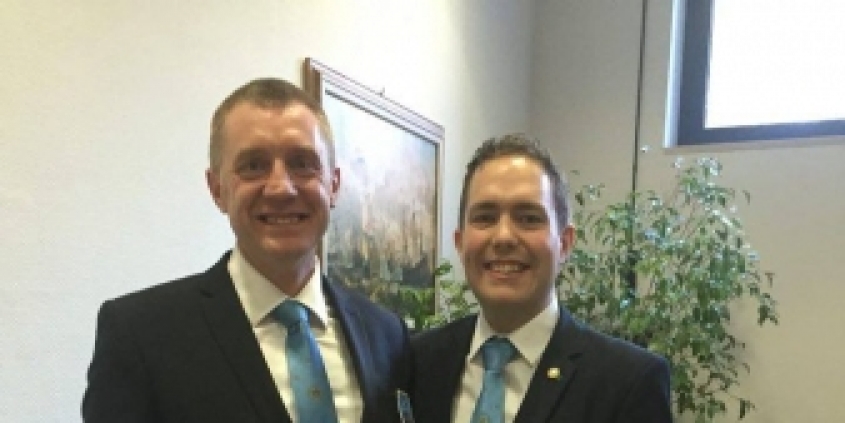British duo gain IJF Continental Awards
Last month at the Lignano Junior European Cup in Italy British referees Stefan Newbury and Graeme MacLachlan received their IJF Continental awards. They are the latest British referees to receive this award and means that in the space of six and a half months Britain have qualified four new IJF referees.
We caught up with Stefan and Graeme to chat about the examination, what it was like receiving their awards and what their ambitions are going forward:
Editor: Congratulations on receiving your award last month and thanks for agreeing to talk to us. How did it feel to have your name called out?
Stefan Newbury: It was brilliant. It was just a surreal feeling and a bit of a relief. The build up to it was really intense as we didn’t really have that long to prepare for it. We found out in December at the British Championships and then the exam was in April so we had three months really to prepare.
Graeme MacLachlan: It was a great honour to be selected to represent Great Britain at the examination.
How long have you been refereeing for?
SN: 2001 I started refereeing at my local club Samurai Kidderminster to help out with competitions really. We hosted lots of competitions throughout the year at all levels and like player I started with the beginners competitions and then worked my way up. Right now I’d say I’m the equivalent of an international cadet.
GM: I started refereeing to help with my competition judo as I believe knowing the rules and understanding their current application helps any competitive judoka.
How would you describe your refereeing style?
SN: I hope to think that it’s positive. I try to allow the players to show what they’ve got and to not be to obtrusive and stop for every little thing but sometimes you have to when it’s blatant.
GM: I believe that the referee’s job is to ensure that the right player wins every fight, preferably by the right score or penalty, and I try to develop my refereeing to make that happen. We all referee or coach trying to simply help the current players to develop their maximum potential.
What’s your favourite part about being a referee?
SN: I enjoy the challenge of trying to separate the two players based on their merits and judging the judo really. It’s just enjoyable. There’s the challenge of actually doing it and then there’s the social side as well. You get to make lots of friends, you get to travel the world and referee at some big events all over Europe!
What was the assessment like and what did it entail?
SN: It was a normal competition really, a normal Junior European Cup except there was an extra day on the Friday. On the Friday I had an interview and a theoretical examination which was followed by the normal briefing in the evening and then refereeing as normal throughout the weekend. As European Cups go there were more eyes because the EJU commission were there so there were four pairs of eyes where normally you’d have one or two. It was a bit more intense from that point of view but it was a normal Junior European Cup and I’ve done a few of those before.
Any nerves?
SN: Yes, it was nerve-wracking definitely. There was a big build-up to that event and it was nervous to be in the examination. But I think it helps in a way because it shows how important it is and makes sure you’re on your game for the weekend.
GM: I believe that both Stefan and myself had prepared well for the exam and that our skills and knowledge were at the required level in order to pass, however it’s fair to say I was a little nervous until I got on the mat.
What’s next for you?
SN: The next steps will be European Opens and then hopefully if you’re lucky enough and you progress well enough it’s onto Grand Prix and Grand Slams again similar to a player. You do European Cups first, get onto the British squad and carry on doing European Cups, progress to Continental Opens and then onto Grand Prix and Grand Slams and hopefully major events like the Europeans and Worlds at different age categories, you’d probably start with Cadets and Juniors and then progress through to Senior eventually.
GM: Just like a competitive player, advancement and my new qualification means that I can go to bigger and better events, and challenge myself further. Maybe one day I’ll be selected to go for IJF A and I’ll certainly be trying my best with the help and advice of my colleagues.





